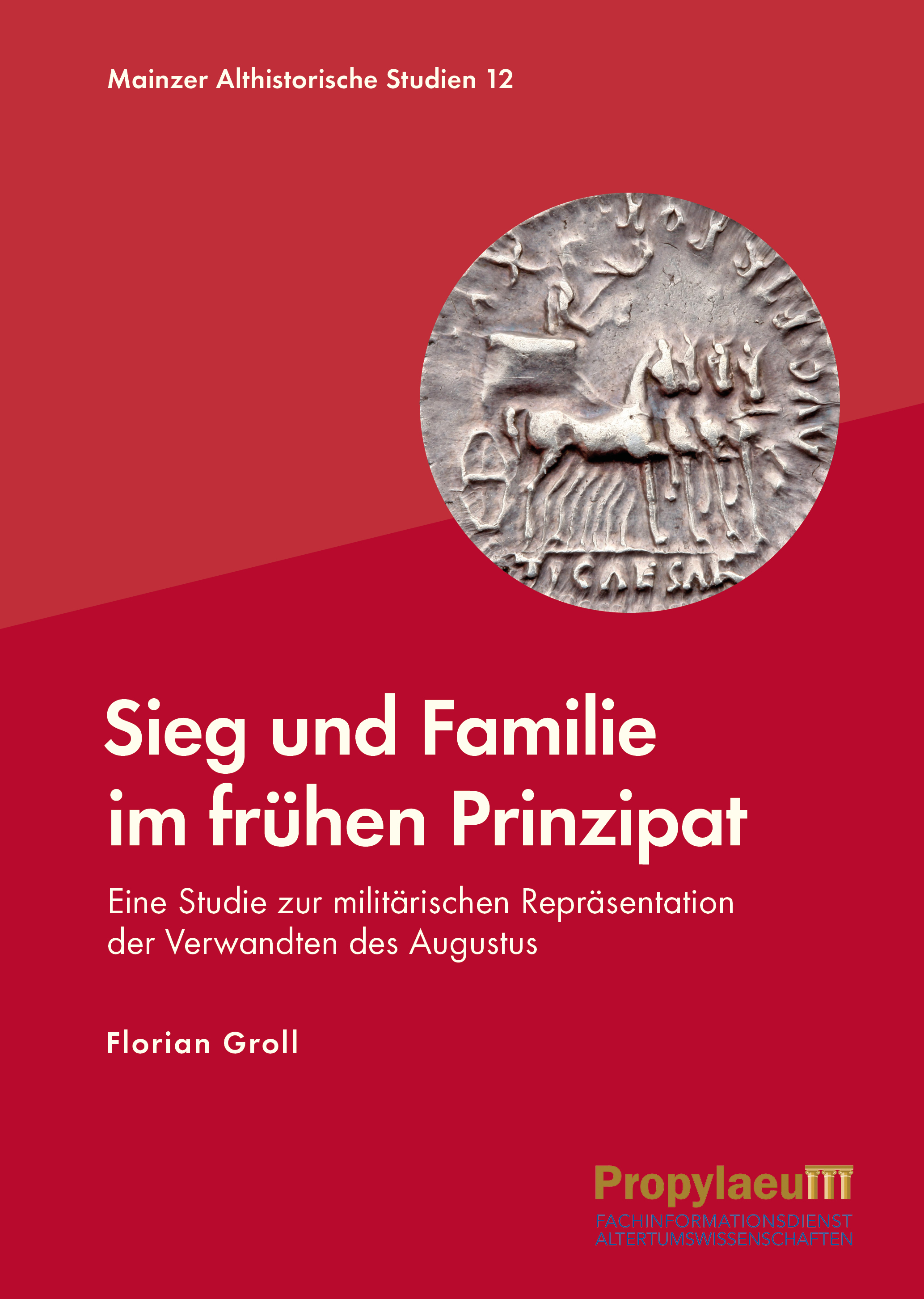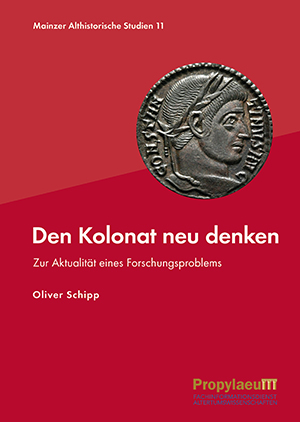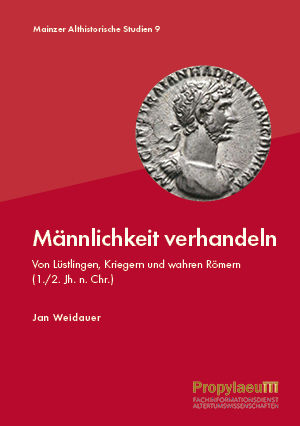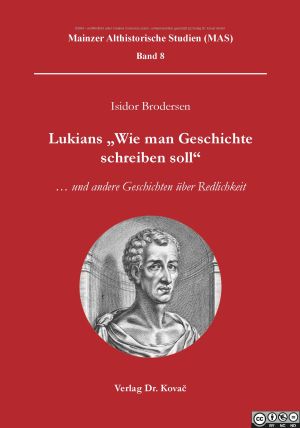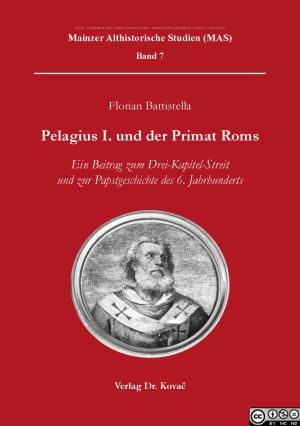Mainzer Althistorische Studien (MAS)
The Mainzer Althistorische Studien have been published by the Department of Ancient History at the Johannes Gutenberg University Mainz since 1998. The series contains monographs in Classical Studies with a thematic spectrum ranging from the history of religion, culture, and social history, through the history of literature and language, to the economic history of Greco-Roman antiquity. Priority is given to the publication of outstanding academic papers, authored at the Johannes Gutenberg University of Mainz. The series appears irregularly and has been published since Volume 9 (2020) in cooperation with Heidelberg University Library in Print-on-Demand, as well as being freely available for download in Open Access. Volumes 1 to 6 have been published by Scripta-Mercaturae Publishing, volumes 7 and 8 by Dr. Kovač. In the meantime, older volumes are being digitalized. Once the usage rights have been obtained, the volumes will be gradually made available online via Propylaeum eBooks.
Editor
Marietta Horster
Johannes Gutenberg-Universität Mainz
E-Mail: horster@uni-mainz.de
Published so far
Sieg und Familie im frühen Prinzipat: Eine Studie zur militärischen Repräsentation der Verwandten des Augustus
This book examines how the military prowess of Augustus’ family was advertised within the city of Rome. The study draws on a variety of different sources. The focus is on contemporary written sources – in particular texts by the poets Virgil, Horace and Ovid. In addition, the study takes into account Rome’s monumental architecture and reports on celebrations for Augustus’ relatives held in the city. On this basis, the book paints a multifaceted, polyphonic picture of the discourse surrounding Rome's new first family and its military achievements.
Den Kolonat neu denken: Zur Aktualität eines Forschungsproblems
The study is dedicated to the question of the emergence and development of the colonate. For this purpose, structural framework conditions and contingent factors are examined for the first time, which brought about the colonate by means of legislation, such as the political-legislative framework, internal and external wars as well as changes in climatic conditions. The colon laws of Late Antiquity are, according to the view put forward here, not the result of a progressive development that led to the colonate, but the beginning of a process in the course of which the colonate emerged. With the reign of Constantine, the Great, according to the thesis, the fateful development of their personal law status began for the colonates.
Männlichkeit verhandeln: Von Lüstlingen, Kriegern und wahren Römern (1./2. Jh. n. Chr.)
This study analyzes ancient discourses of masculinity in the 1st/2nd centuries CE, in which the practice of elite Roman masculinity is negotiated. Performativity and habitus serve as theoretical concepts to guide the exploration of the limits of permissible configurations of Roman masculinity. One the one hand, literary representation of sexually deviant men, whose norm transgressions are exposed, are examined in the epigrams of Martial and the satires of Juvenal. One the other hand, the depiction of hyper-masculine German barbarians as well as decadent and effeminate Greeks are analyzed in the texts of Tacitus and Quintilian. The contrast to these men, who are deficient from a Roman perspective, achieves a more precise view of “real” Roman masculinity.
Lukians „Wie man Geschichte schreiben soll“: … und andere Geschichten über Redlichkeit
Lucian of Samosata (2nd century AD) is best known for his humorous and satirical works. However, he also produced the only surviving treatise from antiquity dealing extensively and explicitly with historiography and its rules. Accordingly, this work is regarded as an important source for the study of ancient historiography.
However, especially with Lucian as the author, it is far from certain that the primary aim of the treatise is, in fact, to educate its readers in the art of historiography. This study aims at tackling this question by reading “How to write history†not within the historiographical discourse, but rather as part of Lucian’s literary game. As an author of the Second Sophistic, Lucian succeeds in amusing his audience under the guise of historiographical teaching.
In connection with two other works by Lucian, a picture emerges of an author who is not only proficient in the classical canon. Rather, by staging the classics and parading his contemporaries, he is able to combine his criticisms with humour. Historiography in “How to write historyâ€, elegant narration in the “True historiesâ€, and as the gullibility of his contemporaries in “Alexander†all serve Lucian’s aim of distancing himself and his readers from would-be educated people and impostors. Thus, the literary game can be seen as a tool for self-confidence and distinction within the Second Sophistic.
Pelagius I. und der Primat Roms: Ein Beitrag zum Drei-Kapitel-Streit und zur Papstgeschichte des 6. Jahrhunderts
Der (ost-)römische Kaiser Justinian I. (527–565) ist für seine Wiedereroberung Italiens und seine Rechtskodifikationen bekannt. Wie viele seiner Vorgänger war auch er um die religiöse Einheit der Christenheit bemüht. In diesem Zusammenhang verurteilte er die sogenannten Drei Kapitel, was allerdings zu langanhaltenden theologischen Auseinandersetzungen führte.
Die kaiserliche Maßnahme wurde vom Zweiten Konzil von Konstantinopel (553) bestätigt und vom römischen Bischof Vigilius (537–555) übernommen. Vigilius hätte die kaiserliche Position im Westen vertreten, doch er verstarb auf der Rückreise von Konstantinopel. Somit war die Kontroverse im Westen nicht beendet. Viele Christen lehnten die Verurteilung der sogenannten Drei Kapitel weiterhin ab. Pelagius I. (556–561), Vigilius‘ Nachfolger als Bischof von Rom, war ursprünglich ein Gegner der Verurteilung, vertrat aber nun den justinianischen Standpunkt.
Die Studie sucht nach Gründen für Pelagius‘ überraschend wirkende Nachfolge und fragt danach, wie er seine Position legitimieren und sichern konnte angesichts der theologischen Differenzen, die gerade auf der italienischen Halbinsel besonders ausgeprägt scheinen.
Durch eine eingehende Analyse zahlreicher Briefe Pelagius’ I. zeigt Florian Battistella die Vielschichtigkeit der Kontroverse auf. Er macht deutlich, dass der Drei-Kapitel-Streit mehr ist als eine bloße theologische Auseinandersetzung zwischen griechischem Osten und lateinischem Westen. Pelagius I. und der Primat Roms ist somit ein Aufruf, die theologischen Entwicklungen des sechsten nachchristlichen Jahrhunderts aus einer anderen Perspektive zu betrachten.



